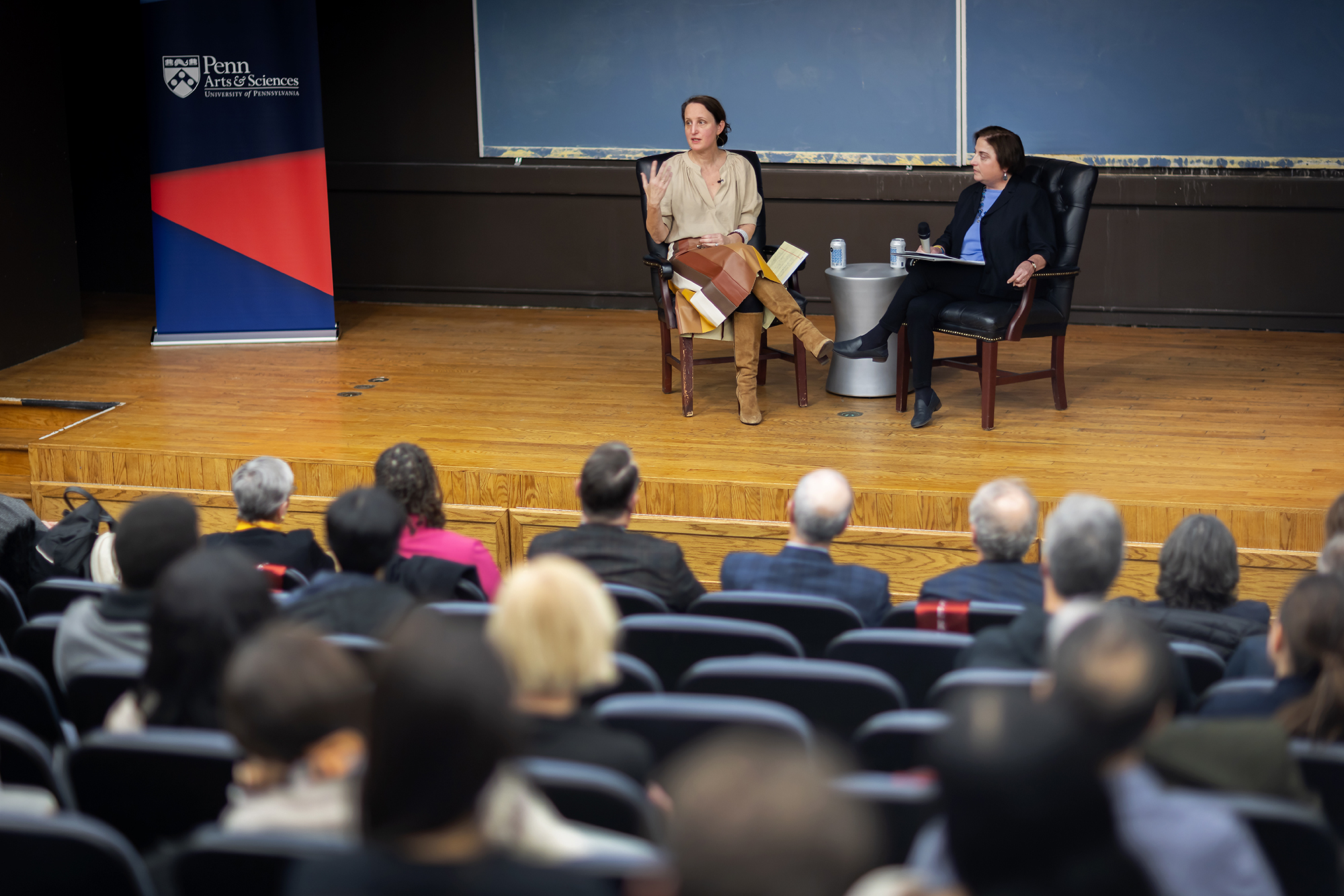
Associate Dean for Graduate Studies Beth S. Wenger (right) led historian Sophia Rosenfeld in a conversation examining the purpose, history, and challenges of open expression on campus.
Writer: Kristen de Groot
Photographer: Eric Sucar
The inaugural event in the School of Arts & Sciences’ “Living the Hard Promise” dialogue series featured a conversation with history professor Sophia Rosenfeld, examining the purpose, history, and challenges of open expression on campus.
“Open expression is a hard promise. It is both a firm commitment and an extraordinarily difficult one,” said Steven Fluharty, dean of the School of Arts & Sciences (SAS), before the inaugural conversation on Feb. 1. “The mission of the University requires that we question our assumptions and try to look through the eyes of others. Only through such dialogue can we begin to wrestle with the most challenging issues of our time.”
SAS announced the new series last fall to encourage respectful dialogue across the Penn community on challenging issues. SAS will be offering several events this spring in the series to share perspectives, provide commentary, and foster dialogue, Fluharty said.
“In setting the tone for these discussions, it was clear that our first priority had to be an examination of both the importance of and the challenges associated with free speech on campus,” he said.
Beth S. Wenger, the associate dean for graduate studies in SAS, then led Rosenfeld in a conversation.
“The series grew out of our commitment in SAS to create forums where Penn students, faculty, staff, and alumni could grapple with the challenging questions and debates that have gripped the campus in recent months,” Wenger said after the event.
The goal was to offer a productive way to engage and bring together the Penn community to tackle complex issues, while modeling and promoting respectful discourse.
“We’ve had so many voices, especially those coming from outside Penn, that portray the campus as hopelessly divided and in disarray,” Wenger said. “We believe that the mission of universities is to foster robust debate, allow for legitimate forms of protest, and enable diverse points of view to be heard. Our community possesses the ability to rise to the challenges of this historical moment.”
In two recent pieces in The New York Times, Rosenfeld has reflected on the challenges of getting the parameters of free speech right at a time when what can be said on campuses is being hotly debated—both inside universities and in the public realm—and when boundaries are being tested in new ways.
"I think it’s very important in this moment to affirm the importance of both First Amendment rights and academic freedom in order to provide a very wide latitude for speech at colleges and universities,” Rosenfeld said. “It is important in times of conflict to let students and faculty alike explore the widest possible range of ideas. That said, there always need to be some limits. There’s no such thing in practice as free speech absolutism. What we are debating is where the lines are.”
Her conversation with Wenger in the Penn Museum’s Rainey Auditorium was held in front of an audience that included undergraduates, graduate students, faculty, and staff, who were all invited to ask questions after the discussion.
Reflecting on the event and series, Paul Sniegowski, dean of the College of Arts and Sciences and professor of biology, said, “Robust exchange of ideas and opinions is central to the life of a great college. Such exchange will not always feel comfortable—even when carried out with the utmost civility—yet it is essential to a greater understanding of our world and each other. The ‘Hard Promise’ series is dedicated to cultivating open expression and open dialogue in pursuit of greater understanding.”
